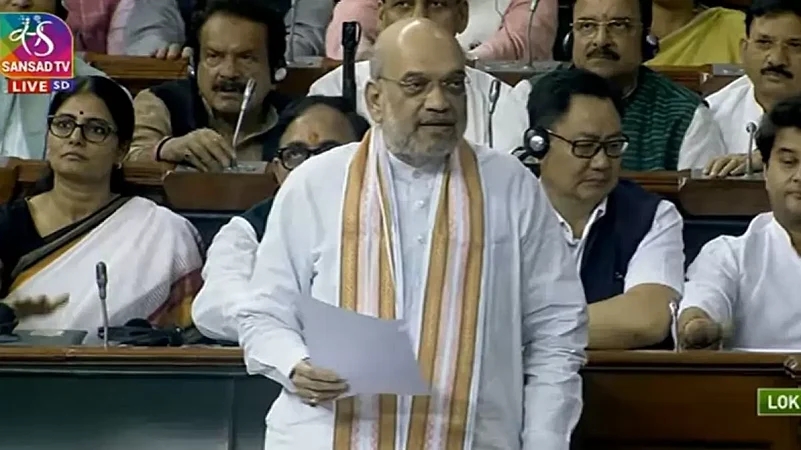Union Minister of Home Affairs Amit Shah on Friday announced the Centre is repealing the contentious sedition law.
In the past few years, there have been frequent calls for the repeal of the British-era sedition law amid allegations that the states have used the law to stifle dissent and criticism of the government and political parties in power.
Shah announced the sedition law's repeal as part of the complete overhaul of the Indian criminal justice system. The three laws governing the criminal system are set to be replaced by new legislations: Indian Penal Code (IPC), 1860 to be replaced by Bharatiya Nyaya Sanhita, 2023; Code of Criminal Procedure (CrPC), 1973 to be replaced with Bharatiya Nagarik Suraksha Sanhita, 2023; and Indian Evidence Act, 1872 to be replaced by Bharatiya Sakshya Bill, 2023.
Notably, the development comes within months of a recommendation from the Law Commission to keep the sedition law and enhance the minimum imprisonment.
Here we explain what's the sedition law and what's the new law that's set to replace it.
What is the sedition law?
The sedition law is a British-era provision in the Indian Penal Code (IPC), 1860.
The British rulers booked freedom fighters and journalists like Mahatma Gandhi, Bal Gangadhar Till, Shankerlal Banker, Jogendra Chandra Bose, Maulana Abul Kalam Azad, etc. The law as well as the practice to target critics with the law continued after the Independence.
The sedition is covered by Section 124 (A) of the IPC and convicts can be punished by a fine or an imprisonment of either three years or a life sentence.
The Section 124 (A) reads: "Whoever by words, either spoken or written, or by signs, or by visible representation, or otherwise, brings or attempts to bring into hatred or contempt, or excites or attempts to excite disaffection towards the Government established by law in India shall be punished with [imprisonment for life], to which fine may be added, or with imprisonment which may extend to three years, to which fine may be added, or with fine."
The IPC explains that "disaffection" includes disloyalty and all feelings of enmity.
In April, the Law Commission recommended that the sedition law should remain in place and that the minimum imprisonment should be extended to seven years.
The Law Commission recalled that the panel in a report in 1971 found it "very odd" that a person guilty of sedition could be imprisoned for either three years or for life with no other sentence in between.
"The 42nd Report of the Law Commission termed the punishment for Section 124 (A) to be "very odd". It could be either imprisonment for life or imprisonment up to three years only, but nothing in between, with the minimum punishment being only fine," said the Law Commission, recommending that the three years imprisonment should be extended to seven.
The panel said it would allow the courts "greater room to award punishment for a case of sedition in accordance with the scale and gravity of the act committed".
What is the new law replacing sedition?
Though the Centre has said it's repealing Section 124 (A) that governs sedition, it's bringing another provision with similar provisions.
Section 150 of the Bharatiya Nyaya Sanhita Bill, 2023, which replaces the Indian Penal Code (IPC), 1860, addresses the "acts endangering sovereignty unity and integrity of India".
The section says, "Whoever, purposely or knowingly, by words, either spoken or written, or by signs, or by visible representation, or by electronic communication or by use of financial mean, or otherwise, excites or attempts to excite, secession or armed rebellion or subversive activities, or encourages feelings of separatist activities or endangers sovereignty or unity and integrity of India; or indulges in or commits any such act shall be punished with imprisonment for life or with imprisonment which may extend to seven years and shall also be liable to fine."
The inclusion of seven-years-imprisonment appearance to be a nod to the recommendation made by the Law Commission made in April.
Moreover, while the Centre has removed the word 'sedition' and has reworked the wording, the Section 150 of the proposed Bharatiya Nyaya Sanhita Bill, 2023 appears to keep the spirit of the provision in the statute. The proposed new section also includes "electronic communication or by use of financial mean" which appears to broaden the scope of the provision and update it with the changing times.
Hindustan Times noted that "the offence of sedition has been retained under the proposed law with new nomenclature and a more expansive definition of what will constitute 'acts endangering sovereignty unity and integrity of India'."
HT reported, "A key change in the proposed draft Section 150 of the BNS bill is the removal of a provision, which allowed a person convicted of sedition to get away only with a fine: Section 150 of the bill prescribes imprisonment for life or with imprisonment which may extend to seven years, in addition to fine, as punishment."
The paper further reported that the new provision appears to expand the discretion of law enforcement agencies in prosecuting the accused.
"Notably, the draft provision adds “indulges in or commits any such act”, leaving a greater discretion with law enforcement agencies to decide what can be brought within the fold of an act “endangering sovereignty unity and integrity of India” for the purposes of slapping the charges," reports HT.
On May 11, the Supreme Court put on hold the sedition law and asked the governments to not book and arrest people under the law. The Supreme Court issued the order amid hearings on a clutch of petitions challenging the validity of Section 124 (A).


























